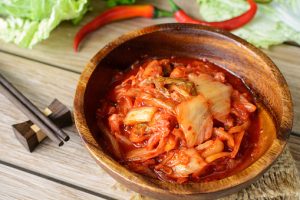
This is why it’s important to feed your liver healthy foods, which ensure it continues to perform its many functions on a regular basis and keeps you healthy.
So what should you eat to keep your liver healthy? Read on to uncover the best foods for liver health.
Top foods for a healthy liver
Dark leafy greens: Kale, dandelion leaves, Brussels sprouts, and cabbage are all great examples of dark leafy greens, which can help promote detoxication of the liver.
Water: Drinking adequate amounts of water helps flush your system of toxins. All your vital organs require proper hydration to function. Water also aids in digestion, which removes some stress from the liver.
Cruciferous vegetables: Broccoli, cauliflower, cabbage and bok choy all contain compounds that could prevent the formation of carcinogens in the stomach, which is a response to foods made with hydrogenated oils and sodium nitrate.
Sea vegetables: Sea vegetables like seaweed can help promote detoxification and reduce uptake of radioactive particles.
Sprouted seeds, nuts, beans, and grains: Sprouts are high in enzymes that promote many bodily functions, including those carried out by the liver.
Sulfur-rich foods: Foods that contain sulfur include garlic, onions, shallots, artichokes, and medicinal mushrooms. They can aid in detoxification and fight off free radicals.
Fruit: Berries, in particular, contain phytochemicals, which are compounds rich in antioxidants that help the liver combat free radicals. Apples, too, can work to improve liver health.
Prebiotic-rich foods: You probably have heard of probiotics, but prebiotics are necessary to feed probiotics, which work to improve digestion and gut flora. Prebiotics deliver dietary fiber to probiotics so they can flourish.
Fermented foods: Fermented foods have been found to aid in digestion and provide the body with beneficial bacteria.
Healthy fats: Flax seeds, hemp seeds, chia seeds, coconut oil, avocados, and olive oil contain anti-inflammatory properties, take digestive strain off the liver, lower inflammation, and regulate hormones, which are all necessary to maintain the liver’s good health.
Animal proteins: Not all animal proteins are good for your liver. You should stick with grass-fed meat, fatty low-toxin fish, and grass-fed whey protein powder to get adequate protein without straining your liver.
Plant-based proteins: Proteins are essential for building new cells, maintaining tissue, and synthesizing new proteins. You can still get adequate protein even if you don’t eat meat by consuming marine or land-based proteins such as beans, seeds, and microalgae.
Oatmeal: High fiber foods like oatmeal can help promote a healthy liver.
Coffee: Several studies have shown the positive effects on the liver. Two to three cups of coffee a day have been shown to offer protection to the liver against damage from drinking alcohol or an unhealthy diet. Some studies have suggested coffee drinking may protect the liver against cancer.
Almonds: Nuts in general are high in essential vitamins that can benefit the liver and protect against disease. Almonds can also support a healthy heart which makes them an ideal snack throughout your day.
Herbs and spices: Herbs and spices not only make meals taste delicious, but they offer healthy polyphenols. Furthermore, they help you cut back on salt which is dangerous for blood pressure and the liver.
Related: Make this simple change and your liver will thank you